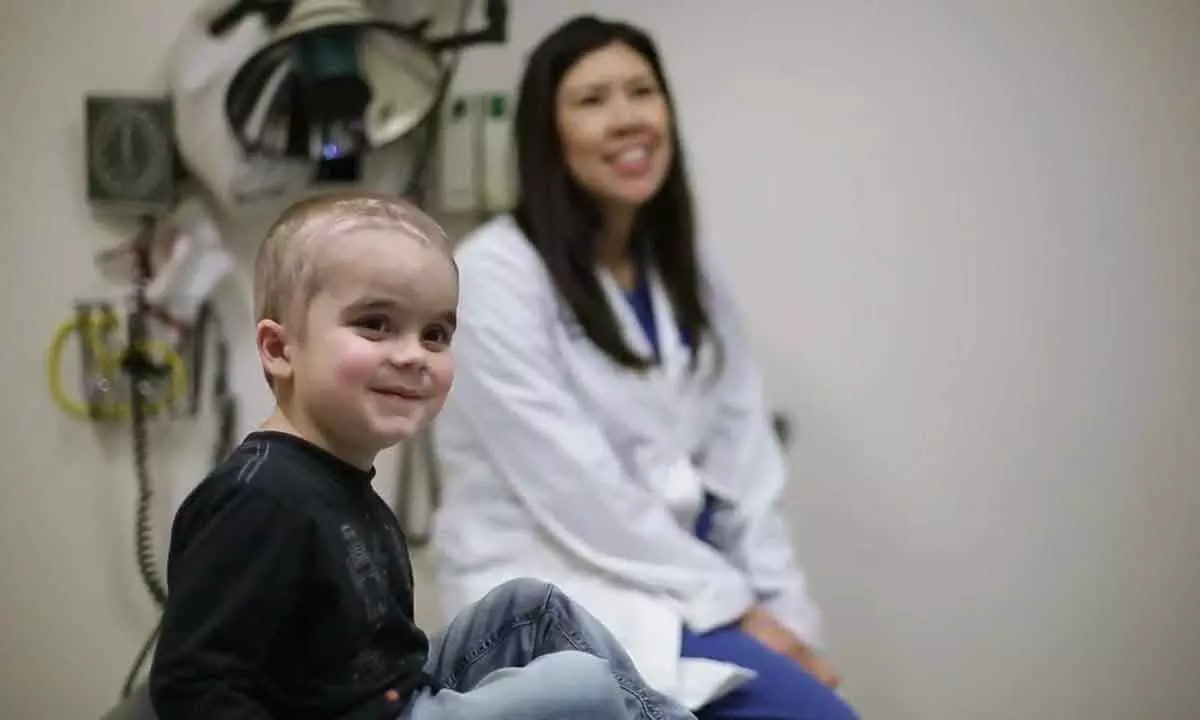Live
- 2024 on track to be hottest year on record
- PM Modi’s visit to Solapur: Women applaud ‘Double-Engine’ government’s initiatives
- Nagarkurnool MLA Dr. Kuchukulla Rajesh Reddy Campaigning in Maharashtra Elections
- Wife Kills Husband with Her Lover: Details of Veldanda Murder Case Revealed by SP Gaikwad
- Strict Action on Violations of Food Rights: Telangana Food Commission Chairman Goli Srinivas Reddy
- Smooth Conduct of Group-3 Exams with Strict Security Measures: Collector Badavath Santosh
- Delhi HC orders cancellation of LOC issued against Ashneer Grover, wife
- Shami’s absence a major blow for India in BGT, says Paul Adams
- Will organize protests at borders if attack on minority Hindus in Bangladesh not stopped: Bengal LoP
- Dutch Ambassador Marisa Gerard Meets Telangana CM A. Revanth Reddy in Delhi
Just In
Understanding Pediatric Brain Tumours: Types and symptoms


Brain tumor is 2nd most common pediatric cancer contributing 20-25% of total pediatric malignancies. While the exact causes remain under...
Brain tumor is 2nd most common pediatric cancer contributing 20-25% of total pediatric malignancies. While the exact causes remain under investigation, early detection is crucial for successful intervention.
This article explores the symptoms of pediatric brain tumours and empowers parents with knowledge for their child’s well-being.
Incidence in India
Studies suggest a higher incidence of childhood cancers is steadily increasing all over the world more so in India.
This highlights the importance of awareness and access to quality healthcare.
Brain tumours in Children
Brain tumours are part of the central nervous system (CNS) tumours. Every year, 40,000 to 50,000 people are diagnosed with brain tumours in India, and 1/4thof these cases occur in children. These tumours typically develop from abnormal cell growth within the brain, and can exert pressure on surrounding areas, leading to a variety of symptoms. The specific symptoms will depend on the tumour’s location, size, and individual factors.
Common Symptoms
Headaches: Frequent or persistent headaches, especially worsening over time, can be a red flagsigns. These headaches mostly accompanied by nausea and vomiting.
Vision Changes: Blurred vision, double vision, or other visual disturbances can occur due to pressure on the optic nerves or visual pathways in the brain.
Behavioral Changes: Irritability, mood swings, personality alterations, or a decline in cognitive function can be signs of a brain tumour.
Seizures: Seizures, resulting from abnormal electrical activity in the brain, are a potential symptom, particularly if the tumour affects the cerebral cortex.
Motor or Coordination Issues: Difficulty walking, weakness, or clumsiness may indicate pressure on motor areas of the brain.
Hormonal Imbalances: tumours near the pituitary gland can disrupt hormone production, leading to growth problems, delayed puberty, or other hormonal issues.
Balance and Coordination Problems: Difficulty maintaining balance or coordination can be a sign of certain brain tumours.
It is crucial to remember that these symptoms can vary depending on the specific tumour. If you notice any of these signs in your child,prompt medical evaluation is essential. Early diagnosis allows for timely intervention and improves treatment outcomes.
Types of Pediatric Brain tumours
Several types of brain tumours can occur in children, each with its own set of potential symptoms:
Medulloblastoma: Arises from posterior fossa in the brain
Gliomas: These common tumours arise from glial cells and can occur in various brain regions. Symptoms may include headaches, nausea, vomiting, and vision changes.
Ependymomas: These aggressive tumours can cause headaches, irritability, and behavioral changes.
Pineal tumours: Located in the pineal gland, these tumours can cause headaches, vision problems, and hormonal imbalances.
Craniopharyngiomas: These rare tumours affect the pituitary gland and nearby structures, potentially causing headaches, vision changes, and hormonal issues.
Germ cell tumours: Developing from germ cells, these tumours can occur anywhere in the brain, and symptoms depend on their location and size.
Other rare variants like ATRT are seen in infants and toddlers.
While childhood brain tumours are a serious concern, knowledge is empowering. By familiarizing yourself with the common symptoms and seeking medical evaluation promptly, you can play a vital role in your child’s health and well-being.
Diagnosis:
With given clinical symptoms, physicians usually ask for neuroimaging which is classically MRI scan to pin point size, location and character of tumor. CSF analysis and blood tests are supportive investigations in diagnosing their conditions.
Management of brain tumors require multi-disciplinary approach with oncologist, neurosurgeons, neurologists, intensivists working together. Classically, surgery is main choice of treatment followed radiotherapy and chemotherapy in certain tumors.
(The author is a Pediatric Hematologist & Oncologist, BirthRight by Rainbow Hospitals, Banjara Hills, Hyderabad)

© 2024 Hyderabad Media House Limited/The Hans India. All rights reserved. Powered by hocalwire.com






